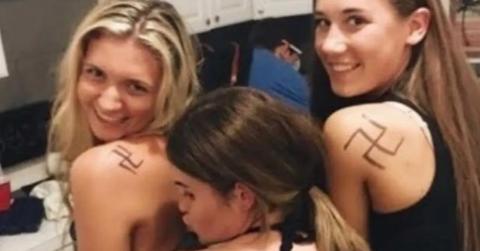
As a Jewish woman, this anti-Semitic photo is a reminder of the pervasive threat of hate in 2020
By Danielle BacherJune 23 2020, Updated 10:44 a.m. ET
In the midst of racial equality protests following the murder of George Floyd, a recent photo of college students with drawn-on swastikas on their shoulders surfaced—bringing me to tears.
It's hard to imagine Ryann Milligan, a Penn State student, who has been identified in a change.org petition, stands with her friends smiling proud, showing off their swastikas and anti-Semitism. All over the country, people are angry and hurting. These egregious acts tear us further apart.
The photo reminds me of the first time I saw a swastika tattoo. It was 2007, and I had just turned 21 years old, entering into my junior year at Temple University. I was moving into a new apartment in Philadelphia, bright-eyed and hopeful to be a journalist and graduate soon. My roommate at the time was dating a sweet guy, someone I had met through social circles and lived down the hall from me on campus the year before.
He invited his friend, someone I had never met, to help us move all the heavy furniture. It was a sweltering day in Center City, temperatures nearing 100 degrees, pearlescent sweat mustaches dotted our upper lips and perspired our faces. The friend I never met before, peeled off his shirt, leaving his white chest exposed. There it was—the hooked cross swastika tattoo of oppression and symbol of hatred— right in front of me.
I stood there, alone with him, looking at this large swastika near his right shoulder. It was an immediate gut punch. I wondered if he knew I was Jewish? If he found out, would he harm me? Does he hate black people too? I thought about all the times I read about people like him. All the racism, prejudice, xenophobia and white supremacy that's continued to grow across the globe. I remembered my recent trip to Israel and the six million Jews who died in the Holocaust. What about my great grandmother—she was 13 years old when she escaped Nazi Germany on a boat after her entire family was slaughtered in a concentration camp. I thought about all the Jews who have been discriminated against for centuries.
I was silent for a few minutes, but those minutes felt like hours. A phone went off. I ignored it. I stared at him a little longer. "You going to answer it?" he asked me. I gripped the cell phone to my chest. "You know I'm Jewish," I blurted out. He looked perplexed. I pointed to the swastika. "Oh, that," he said. "I got dared to get that one night. I was really drunk. It doesn't mean anything to me." I don't know what offended and enraged me more—that he dismissed it or that he didn't understand why it was a big deal.
He clearly knew very little about the history of Nazism. I felt like it was my responsibility to strengthen his understanding of what it meant. Knowledge was my way of responding to the hate and anti-Semitism. I told him how horrible it made me feel. I explained how Jewish people and black people take that symbol as a sucker punch in the face. To my surprise, he listened and then apologized. He told me he would get it covered up immediately. I hope he did.
Things like this continue to happen in our country. Let's not forget, less than three years ago, hundreds of white supremacists and neo-Nazis marched the streets of Charlottesville, Va., in the "Unite the Right" rally, protesting the removal of a statue of Confederate general Robert E. Lee. They brandished weapons and lit tiki torches, performing Nazi salutes and chanting "Jews will not replace us."
The rally turned violent when white supremacist James Field Jr. steered his Dodge Challenger into a peaceful crowed of counterprotesters, killing Heather Heyer and injuring many others. There was also the off-the-rails press conference with President Trump and his infamous quote: "You had some very fine people on both sides." It's difficult for things to actually change when the leader of our country doesn't fully condemn racism.
Seeing that picture of those young women really brought me back to that day in 2007. That was twelve years ago, but what has really changed? According to the NY Times, the Anti-Defamation League statistics reveal that anti-Semitism has more than doubled in the United States in 2018 over 2015. The question begs why would these young college girls do this? What were they thinking? It could be that they don't know better. Maybe they were raised like this. Maybe it was supposed to be a joke. Who knows.
The University responded to the image in a tweet stating, "We are disgusted by the behavior portrayed, which does not reflect our values. It is deeply troubling that as a society, we today are still facing racism." They also mentioned that they will continue to speak out against hateful speech, but they don't have the power to expel students over it, even if it is reprehensible. "But the University does have the power to condemn racism and address those who violate our values." However, the Change.org petition is asking for Milligan's removal at the college, which has garnered over 120,000 signatures so far.
In a time when our country is in turmoil, strife and demanding change, this can be a learning experience. When the women wash away the black ink swastikas on their skin, I hope they think about the visceral impact it's caused others. I can promise you that pain won't wash away as fast. Maybe they'll think about their actions—let's hope it's tattooed inside their brain. At least, this time, the ink wasn't permanent.
